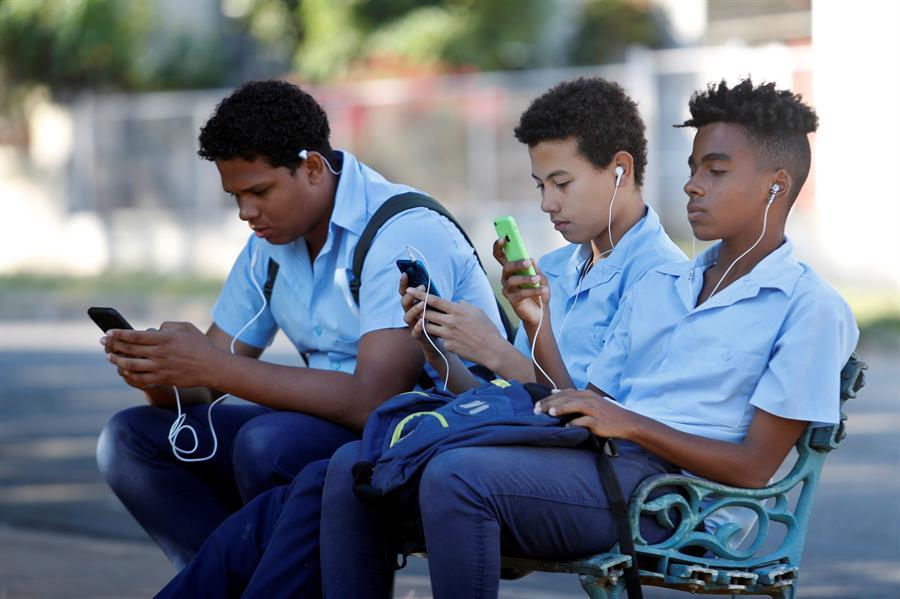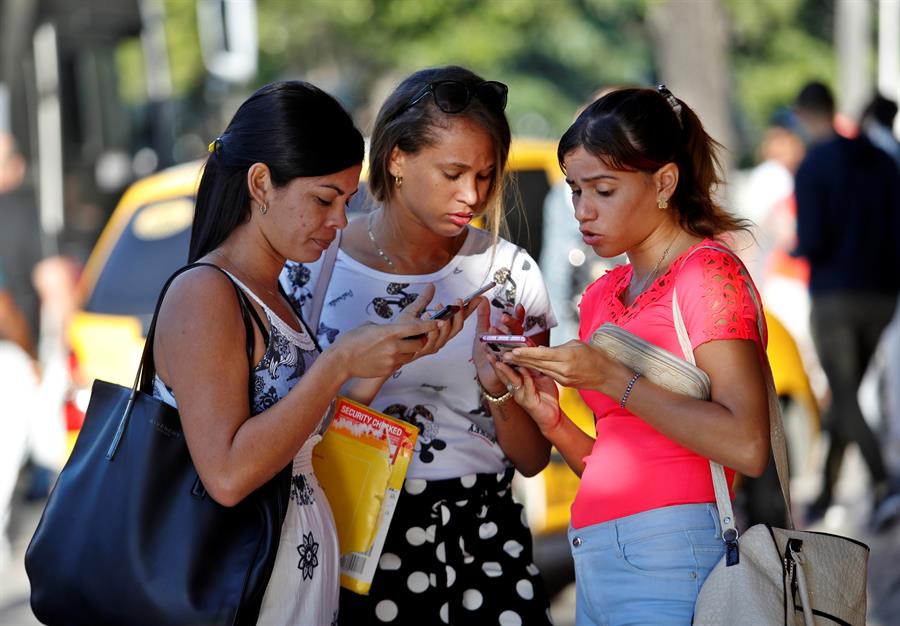Answering WhatsApp messages from bed and posting photos on a bus was something unthinkable for Cubans until a year ago, when the country activated its mobile internet network and took the first step towards a new reality, marked by greater access to information but still weighed down by high prices.
“It was like suddenly entering the real world,” jokes Claudia, one of the thousands of persons who started using the service immediately, one of the most awaited since the island’s government opened the first public Wi-Fi points some three years before.
The young engineer recalls the arrival of 3G “almost like euphoria,” reflected in the more than 1.8 million users who used mobile data in the first 40 days since the service was activated. An average of about 45,000 new customers a day.

An expensive milestone for the average pocket
For journalist and activist Glenda Boza, the arrival of mobile internet has been one of the milestones of the last year on the island, governed by the Communist Party of Cuba (PCC) and, until very recently, one of the most disconnected countries in the world.
“The expansion of access to internet has changed several dynamics in the lives of Cubans: it has led to greater citizen participation and criticism in the social media, the expansion of private services and businesses, greater access to information and it has facilitated unprecedented citizen mobilizations summoned from the social media,” she told EFE news agency.
Boza, who lives and works in the city of Santa Clara, in the center of the country, has managed to overcome the “geographical fatality” of residing outside Havana, the epicenter of the country’s cultural, political and economic life, and is today one of the most active voices on Twitter, where she has more than 3,800 followers.
Together with Facebook and the WhatsApp and Telegram instant messaging applications, Twitter is among the favorites of Cubans, who have greatly increased their online presence, but at an equally high cost.
Despite the recent increase in salaries in the public sector, the average salary of a state employee in Cuba does not exceed 45 dollars. The monthly data plans sold by ETECSA―the only Cuban operator, state-owned―range from 5 CUC (convertible peso equivalent to the dollar) to 35 and 45 CUC in the most expensive packages.
When the service started a year ago, the average salary was even lower and the quality of the signal was worse. The three trials prior to the activation of the 3G network caused congestion in the messaging and voice services.
The state-owned enterprise, which handles the more than 5.7 million active mobile lines, said they had solved the problem. A year later the poor quality of the signal persists in several regions of the country, where the 4G service was already activated last October in some cities.
The #BajenLosPreciosDeInternet (#LowerTheInternetPrices) hashtag adds thousands of tweets and publications that ask ETECSA to apply flat rates and reduce the cost of their offers.
“The increase in internet access for Cubans, which does not mean that the Internet is available to everyone, is a step forward for our society. I hope that what we have today is only the first step towards a more connected country,” insists entrepreneur Camilo Condis.
Rapid evolution and governance on Twitter
Condis, one of the most prolific Cuban tweeters, believes that “the evolution has been rapid” although many are still “adapting to the dynamics of the Internet.”
“A little over a year ago, many Cubans had not used Facebook, Instagram, Twitter, or YouTube, and today there is talk of Cuban ‘influencers,’ successful ‘Youtubers ’and ‘Instagram girls.’ On the other hand, we have been finding communities that are united by digital means around common interests,” he explains.
Cubans have learned to get organized for causes such as animal rights or the defense of the LGTBI community, in movements that have become “physical mobilizations,” unprecedented in a country that does not allow public demonstrations.
The digital evolution of Cuban society has reached the government, led by the first Cuban president whose surname is not Castro in more than 60 years: Miguel Díaz-Canel, a 59-year-old engineer who also became the island’s first president with a Twitter account.
After assuming the country’s leadership in April 2018, Díaz-Canel insisted that all his ministers increase their presence in the social media. Shortly after the official website of the Presidency was launched and the citizen “Bienestar” application for complaints was launched.

The pressure and complaints in the social media about various events―such as the recent death of a baby after being vaccinated―have influenced the state media agenda and provoked prompt responses from the government, little prone to rapid reactions.
For many, however, the “essence” remains intact. “It is still the same repeat and copy of a deaf institution that the only thing it reports on is the slogan of the day,” says Alejandro Ulloa, a journalist of El Toque, one of the main Cuban alternative media.
Condis, for his part, agrees that in practice there are few leaders who really interact “and when they do, it is almost always to accuse as ‘mercenaries’ those who criticize their management…. If the government does not change its closed mentality, nothing will come from having the internet at its fingertips,” he says.
With the emergence of new voices with a strong digital presence, and a press outside the state media, pressures have also increased on so-called independent journalists who report at street level, who sometimes are prevented by the authorities from leaving the country and even their homes.
“Internet access can be a discovery of the diverse Cuba that exists and has already shown that it can be a tool to win rights or at least put pressure to achieve them or put the matter in public discussion,” notes Glenda Boza.
4G and the future
On the future of the Internet in Cuba, Boza mentions electronic commerce as a key step for the country to finally catch up with the rest of the world. Or at least come closer.
“I believe that the development of electronic commerce will be vital for Cubans, not only on government platforms but also on private ones,” she says referring to the means that Cuban entrepreneurs have found to expand their businesses.
Cuban inventiveness has reached the web and many “self-employed” sell items and promote themselves via WhatsApp, Telegram and Facebook.

This week and after strong criticism over the announcement of its most expensive monthly plans so far (35 CUC for 6.5 Gigabits and 45 CUC for 10 Gigabits of information), the state monopoly ETECSA announced its cheapest package so far: 400 megabits for 5 CUC.
The enterprise also activated a special bonus that doubles the amount of data and is exclusive to the 310,000 4G users, 13% of the more than 2.2 million customers who bought data last November, according to ETECSA figures.
This incentive for greater use of the 4G network is due to the need to free the supersaturated 3G, which supports the voice service and where most of the internet traffic still occurs.
The pending issue for ETECSA is now to expand the coverage of the fourth generation, present only in Havana, most of the provincial capital cities and tourist and economic destinations such as Varadero and the Mariel Special Development Zone.











Thank you for sharing.